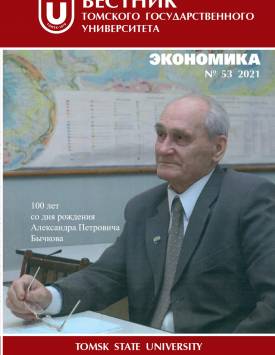Assessment of Satisfaction with the Conditions and Opportunities for Professional Activity in Customs Bodies
There is a need to obtain scientifically grounded data on how young professionals feel about themselves, take their first steps in the customs bodies, how the “system” evaluates in practice the level of graduates’ preparedness, how their interpersonal relations develop while they serve in the customs bodies. An organized and effectively functioning system of adaptation of customs body officials and employees is very important both for a young specialist and for an organization. Such a system decreases the rate of staff turnover, reduces costs, saves the time of the manager and the employees, develops a positive attitude to work, satisfaction with working conditions, and also determines the effectiveness of the follow-up actions of the young professional in the workplace. Professional adaptation in the customs bodies has a number of features due to the specifics of the customs service. The article assesses the impact of satisfaction with working conditions and opportunities in the customs bodies on the adaptation of customs bodies’ officials and employees to the customs service. The article aims to analyze factors affecting satisfaction with working conditions and opportunities, and to develop recommendations for improving the adaptation of young specialists to the customs service using the example of Vladivostok Branch of the Russian Customs Academy graduates working in the customs bodies. The authors identify the approaches to professional adaptation to the customs service; they differ by the object of analysis. A correlation analysis of the graduates’ survey shows a direct positive relationship of individual indicators of external and internal factors. A model assessing work satisfaction and the level of adaptation to the professional requirements has been designed. Recommendations have been developed to improve a young specialist’s professional adaptation to the customs service. The improvement of adaptation management starts from the enrollment campaign, goes through the entire learning process at the educational organization, and ends in the customs bodies. For the officials and employees of the customs bodies, the improvement includes various measures, including the development and implementation of a scientifically based adaptation program.
Keywords
professional adaptation,
young specialist,
self-evaluation,
correlation analysis,
external and internal factors,
customs service,
Far Eastern Customs Administration,
Vladivostok Branch of Russian Customs AcademyAuthors
| Dyakov Vladimir I. | Russian Customs Academy | vid@vfrta.ru |
| Gorchakov Viktor V. | Russian Customs Academy | gorchakov.vv@vfrta.ru |
| Niyazova Marina V. | Russian Customs Academy | marinav.var@gmail.com |
| Stetsyuk Viktor V. | Russian Customs Academy | stetsyuk1983@mail.ru |
| Ismagilova Yulia D. | Russian Customs Academy | isma-86@yandex.ru |
Всего: 5
References
Стратегия развития таможенной службы Российской Федерации до 2030 года: распоряжение Правительства РФ от 23.05.2020 № 1388-р. Доступ из СПС «КонсультантПлюс».
Ershov A., Stepanova E. The analysis of innovative educational technologies’ development in training of customs business specialists in the Eurasian economic community countries // Customs Scientific Journal Customs. 2012. № 1. P. 24-31.
Мочаев С.А. Предупреждение аддиктивного поведения работников таможенной службы в процессе профессионального обучения : автореф. дис.. канд. пед. наук. М., 2012. 26 с.
Попова Д.А. Развитие научно-методического аппарата и разработка практических рекомендаций по адаптации должностных лиц к условиям профессиональной деятельности в целях повышения кадрового потенциала таможенных органов : автореф. дис.. канд. экон. наук. М., 2013. 31 с.
Красницкая Е.Е. Анализ принципов Э. Деминга (модели управления качеством результатов труда) с позиций таможенного дела // Балтийский экономический журнал. 2009. № 2. С. 95-104.
Немченко О.А., Тарасенко А.В. Трудовая адаптация персонала таможенного органа // Вестник Российской таможенной академии. 2016. № 2. С. 132-135.
Блохина Л.Н. Индивидуальные различия в психологической адаптации к условиям в профессиональной деятельности у госслужащих таможенных органов // Психологический журнал. 2008. Т. 29, № 1. С. 79-89.
Мозолева Н.В. Динамика ценностей в процессе формирования таможенных коллективов : автореф. дис.. канд. социол. наук. Ростов н/Д, 2007. 24 с.
Гороховатский Л.Ю. Формирование психологической сопротивляемости личности будущего специалиста таможенных органов профессиональным трудностям : автореф. дис.. канд. психол. наук. Самара, 2013. 27 с.
Клитинова В.А., Корсунова Н.М. Проблемы совершенствования кадрового обеспечения в таможенных органах // NovaUm.Ru. 2018. № 11. С. 121-124.
Лукин В.Н., Мусиенко Т.В., Мальков Н.Р., Яргина Н.Ю. Структура установок трудовой деятельности студентов таможенного вуза: региональный аспект // Таможенные чтения - 2011. Инновационная Россия: вызовы образованию и науке : сборник материалов Всероссийской научно-практической конференции с международным участием. Т. I: Инновационная Россия: проблемы и перспективы : в 2 ч. Ч. I / под общ. ред. А.Н. Мячина. СПб. : Санкт-Петербургский имени В.Б. Бобкова филиал РТА, 2011. С. 259-270.
Ibarra H. Provisional Selves: Experimenting with Image and Identity in Professional Adaptation // Administrative Science Quarterly. 1999. № 44 (4). P. 764-791.
Авдеенко М.А., Слепцова Е.В. Анализ факторов, влияющих на адаптацию персонала // Экономика и современный менеджмент: теория и практика : сборник статей по материалам XLVI международной научно-практической конференции. № 2 (46). Новосибирск : СибАК, 2015. URL: https://cyberleninka.ru/article/n/analiz-faktorov-vliyayuschih-na-adaptatsiyu-personala (дата обращения: 12.05.2020).
Гонина О.О., Ильченко С.В. Актуальные аспекты эффективной системы адаптации персонала // Бизнес и дизайн ревю. 2018. № 3 (11). С. 8-14.
Яценко Е.А. Оценка эффективности адаптации персонала в Малоистокском ЛПУМГ - филиале ООО «Газпром трансгаз Екатеринбург» // Human progress. 2018. Т. 4, № 3. URL: http://progress-human.com/images/2018/Tom4_3/Yatsenko.pdf (дата обращения: 29.04.2020).
Антипов А.А. Подготовка госслужащих в России: социально-исторические истоки современных проблем и образовательные пути их решения // Вестник Российской таможенной академии. 2015. № 1. С. 110-115.
Ткаченко И.Е., Баранова А.В. Компетентностный подход как условие повышения качества кадрового потенциала таможенных органов // Вестник Российской таможенной академии. 2012. № 1. С. 82-87.
Коровяковский Д.Г. Подготовка кадров с высшим образованием по специальности «таможенное дело» как один из элементов обеспечения национальной безопасности России // Таможенное дело. 2016. № 3. С. 36-40.
Коровяковский Д.Г. К вопросу о разработке концепции развития профессиональной подготовки специалистов таможенного дела // Таможенное дело. 2019. № 2. С. 38-40.

